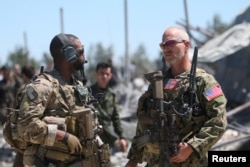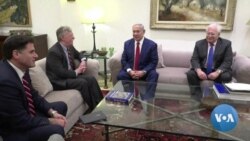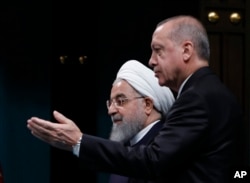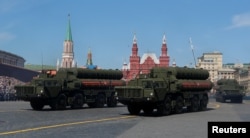President Donald Trump's national security adviser is in Ankara for high-level talks amid renewed bilateral tensions over Washington's backing of a Syrian Kurdish militia, and growing doubts about Trump's commitment to rapidly withdraw U.S. forces from Syria.
Turkish presidential spokesman Ibrahim Kalin appeared to set the tone for John Bolton's visit, describing as "irrational" U.S. diplomatic calls for Ankara to give security guarantees for the Syrian Kurdish militia, the YPG — a crucial ally in Washington's war against Islamic State.
Turkey designates the militia as terrorists linked to an insurgency waged by the PKK rebel group inside Turkey.
December's decision by Trump to withdraw all U.S. forces from Syria was widely interpreted in Turkey as a green light for a Turkish military operation against the YPG.
"The importance of ensuring that the Turks don't slaughter the Kurds was still part of the American mission" in Syria, U.S. Secretary of State Mike Pompeo said Thursday.
On Sunday, Bolton echoing Pompeo's message, Bolton said "any Turkish military operation should be coordinated with Washington, and that the president's requirement that the Syrian opposition forces that have fought with us are not endangered."
Ankara quickly hit back, dismissing Washington's concerns.
"One aim of Turkey's fight against the PKK and its Syrian extensions (YPG) is to rescue the Kurds from the cruelty and oppression of this terrorist group," Turkey's presidential spokesperson Ibrahim Kalin said.
WATCH: US talks with Turkey
Adding to Turkey's unease ahead of the visit, Bolton appeared to outline some preconditions for the withdrawal of U.S. forces from Syria.
"U.S. troop pullout in the foreseeable future is a 50/50 proposal unless the White House works out a deal with Turkey," said analyst Atilla Yesilada of Global Source Partners.
Bolton is joined by the U.S. Joint Chiefs of Staff Gen. Joseph Dunford and James Jeffrey, special envoy to Syria. The delegation is due to have high-level talks with their Turkish counterparts.
High expectations
Given the robust diplomatic exchanges ahead of the visit, expectations for a breakthrough are not high.
"I don't think much will come from these talks," said former senior Turkish diplomat Aydin Selcen. "If there is a deal to be found, it will be found from the two presidents, and not from this visit."
"At the end of the day, whenever there is a contradiction or whether they try to translate what Mr. Trump says, these high-level bureaucrats are at the losing end and have to resign," he said.
Trump's surprise move to withdraw from Syria came during a telephone conversation with Turkish President Recep Tayyip Erdogan in December. The decision fueled speculation of a resetting of ties between the two NATO allies that had been poisoned over differences on Syria.
Iran factor
Bolton is also expected to press Turkey to back U.S.efforts to contain Iran's growing influence in the region.
"Concerning Iran, there will be nothing done," said international relations professor Huseyin Bagci of Ankara's Middle East Technical University.
"Turkey is a partner with Iran," he noted. "Turkey will only try to mediate between Tehran and Washington. In recent months, Turkey has been trying to play the peacemaker. So, Turkey will not want to get involved in this dispute."
In December, Erdogan reiterated opposition to U.S. sanctions against Iran, pledging to work toward undermining them.
While backing opposite sides in the Syrian civil war, Turkey and Iran have increasingly been cooperating on efforts to end the conflict in Syria. However, given historical rivalry, defined in part by the religious divide of Shia and Sunni Muslims, Turkey could yet be receptive to Washington's concerns.
"Underneath the facade of deep friendship and cordiality with Iran," said Yesilada, "Ankara is acutely aware of the Shia Wall plan and may cooperate with the U.S. and the Sunni Axis to prevent its erection in the future."
Turkey, with its large army and long border with Syria, has the potential to contain Iran's influence. Turkish forces already have a sizeable military foothold in Syria. Expanding that military presence to include containing Iran will come at a high price for Washington.
"Ankara has a narrow objective to enter east of the Euphrates [in Syria] to take over from the U.S., not to allow any YPG presence along the [Turkish border]," said Selcen. "For Turkey to play along and contain Iran, then the U.S. will have to offer more."
He said incentives could include "full-scale military and logistic support. Which means probably bigger U.S. support than present in Syria, which is contradictory to what Mr. Trump is saying [about withdrawing from Syria]."
S-400 missile system
Bolton is also expected to address Ankara's planned purchase of Russia's S-400 missile system. Washington claims the system threatens NATO's security and is offering as an alternative its Patriot missiles.
Hopes of resolving a missile system impasse had been growing following the diplomatic momentum generated by Trump's Syria pullout decision. Selcen warns Bolton's visit comes at a critical moment in relations.
"For Mr. Trump to change his position fully [on Syria], it will again be another game changer [in Turkish-U.S. relations], as was the decision to pull out was a game changer," he said.









